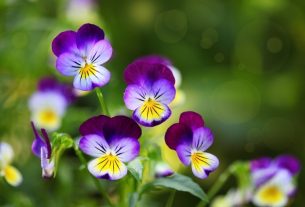Cough teas, such as eucalyptus, cinnamon and thyme help to fluidize secretions, which makes it easier to expel phlegm, combat microorganisms responsible for respiratory changes and improve coughing, and can be a good homemade option to improve this symptom.
Furthermore, it is recommended to increase water consumption to thin secretions and facilitate their exit, as well as to soothe the throat and relieve coughing. To achieve this, it is important to adopt other measures, such as avoiding drafts and walking barefoot during cough treatment.
It is important that before the appearance or worsening of symptoms that accompany coughing, such as fever or difficulty breathing, a doctor is consulted so that symptoms can be assessed and treatment can be started.

Cough teas
Some tea options that help relieve coughs are:
1. Cinnamon, clove and lemon tea
Cinnamon and cloves have bactericidal properties and help eliminate microorganisms responsible for coughing. Lemon and honey contain expectorant properties, helping to strengthen the immune system due to the presence of vitamin C in their composition.
This recipe for cinnamon tea with cloves and lemon also has calming properties, helping to reduce coughs, and can be easily prepared as follows:
Ingredients
- 1 cinnamon stick;
- 3 cloves;
- 1 slice of lemon;
- 1/2 liter of water.
Preparation mode
Place all ingredients in a teapot and let it boil for 5 minutes. Wait for it to cool, strain, sweeten with 1 tablespoon of honey and drink 2 cups of this tea a day.
This home remedy is contraindicated for babies under 1 year of age, as they cannot yet consume honey. In this case, you can use the same recipe, but without adding honey.
Receive a more complete treatment!
2. Eucalyptus tea
Eucalyptus tea can be used in case of changes in the respiratory system, as it has properties that inhibit the development of microorganisms responsible for these changes, helps to thin mucus, is an expectorant and anti-inflammatory, in addition to helping to relieve coughing. .
Ingredients
- 1 tablespoon of eucalyptus leaves;
- 1 liter of boiling water.
Preparation mode
Place 1 tablespoon of eucalyptus in 1 liter of previously boiled water and let it rest for approximately 10 minutes. Then strain and drink 3 cups of this tea a day.
Eucalyptus tea should be avoided by pregnant women, during breastfeeding and by children under 2 years of age. Furthermore, it should be avoided by people with hypertension and who are undergoing treatment with antiepileptics and sedatives, as eucalyptus can interfere with the effectiveness of these medications.
3. Thyme tea
Thyme has properties capable of fighting bacteria, fluidizing and helping to expel secretions, making it a good option for treating respiratory disorders, such as bronchitis and coughing, as it helps to relax the muscles in the airways, relieving this symptom.
Ingredients
- 1 tablespoon of thyme;
- 1 liter of boiling water.
Preparation mode
Place a tablespoon of thyme in 1 liter of previously boiled water and let it rest for approximately 10 minutes. Then strain and drink up to 3 times a day.
If you are pregnant or breastfeeding, it is important to consult your doctor, as although it is not completely contraindicated during this period, it can cause effects on both the woman and the baby if adequate guidance is not provided.
4. Carrot medicine for children’s cough
A great home remedy to stop children’s coughs is pure carrot juice, which has a high concentration of vitamin C and is antitussive, helping to reduce coughing attacks that can persist for a few weeks after an episode of the flu.
Ingredients
- 1 medium-sized carrot;
- Mel.
Preparation mode
Grate the carrot and place it in a glass in the fridge. After a few minutes, the carrot will release its own juice, which must be strained and mixed with the same amount of honey. This juice should be taken several times a day.
Honey should only be used by children over 1 year of age, as it is associated with the occurrence of botulism in babies. For younger children, you can just give carrot juice.
5. Nettle tea for allergic cough
Allergic cough is characterized by a persistent cough that is not associated with flu or colds. In this case, a good home remedy option is nettle tea.
Nettle is a medicinal plant that contains antihistamine properties and, therefore, helps combat various allergies, being effective for treating dry coughs, and can also be used by children. However, you should talk to your pediatrician before starting this treatment, to be sure that the cough is allergic.
Ingredients
- 1 tablespoon of dried nettle leaves;
- 200 ml of water.
Preparation mode
Place water in a pan and let it boil. When it starts to boil, turn off the heat and add the nettle, cover the pan and wait for it to cool, strain and drink afterwards, possibly sweetening with 1 tablespoon of honey. Take 2 cups a day.
This home remedy should be avoided during pregnancy, breastfeeding, people with heart or kidney failure, diabetics, as it can have a hypoglycemic effect, and people with high blood pressure.
6. Mint tea
Mint tea can be used to relieve coughs, sore throats and colds, as its essential oils, such as menthol, and its anti-inflammatory and analgesic properties help to deinflame the throat and airways.
Furthermore, mint has antibacterial and immunological properties, helping to fight flu and colds faster, for example.
Ingredients
- 6 chopped mint leaves;
- 150 mL of boiling water.
Preparation mode
Add the mint to the boiling water and let it rest for 5 to 10 minutes. Strain, sweeten to taste and drink 3 to 4 cups a day.
Mint should be avoided by people with severe reflux or hiatal hernia, and it should not be consumed by children under 5 years of age. In pregnant women, mint may not be completely safe, especially when taken in large quantities, as it can cause changes in the uterus. In the case of breastfeeding women, there is not enough information on the safety of mint and it should only be used under medical advice.
7. Ginger tea with echinacea
Ginger tea with echinacea has anti-inflammatory, expectorant and anti-allergic effects, helping to relieve coughs.
Ingredients
- 1 cm of ginger;
- 1 teaspoon of echinacea leaves;
- 1 cup of water.
Preparation mode
Place the echinacea leaves and ginger in boiling water, cover and let it rest. Strain and drink then.
Ginger is not recommended for people who have gallstones, have bleeding diseases or use anticoagulant medications. During pregnancy, the maximum consumption of ginger should be 1 gram per day and for a maximum interval of 3 consecutive days.
8. Licorice tea
Licorice tea helps reduce throat irritation, as well as helping to eliminate phlegm, making it a very useful herb for treating respiratory problems.
Ingredients
- 1 tablespoon of licorice root;
- 1 cup of boiling water.
- Honey to sweeten to taste.
Preparation mode
Add the licorice to the boiled water, cover and let it rest for 10 minutes. Strain, sweeten with honey and drink up to twice a day.
9. Oregano tea
Oregano tea has properties that increase the production of lung secretions, helping to alleviate dry coughs, the common cold and diseases such as bronchitis, sinusitis and laryngitis, as it also has antibacterial properties.
Ingredients
- 1 tablespoon of fresh or dried oregano;
- 1 cup of boiling water.
Preparation mode
Place the oregano in the cup with boiled water and let it rest for 5 to 10 minutes. Then strain and drink 2 to 3 cups a day.
Oregano is not recommended for people who are more likely to develop allergies to any plant in the Lamiaceae family, including oregano.
10. Dill tea
Dill has antispasmodic and expectorant properties and, therefore, can also be used to treat dry and productive coughs.
Ingredients
- 1 tablespoon of dill leaves and seeds;
- 1 cup of boiled water.
Preparation mode
Place the dill in the cup of boiled water and let it rest for 15 minutes. Then strain and drink.
Dill can cause a decrease in blood sugar and should be used with caution by people with diabetes or who take medications that lower blood sugar.
11. Pomegranate tea
Pomegranate tea is rich in polyphenols, flavonoids, alkaloids and triterpenes, which are substances with antioxidant and anti-inflammatory action, which help fight a sore throat and relieve pain, discomfort and cough.
Ingredients
- 10 grams of pomegranate peel;
- 1 cup of water.
Preparation mode
Add the pomegranate peels to a pan with water. When it starts to boil, leave it for another 5 minutes and turn it off. After this time, cover the pan and let the tea rest for another 5 minutes. Wait for it to cool down and then drink it 2 to 3 times a day.
Pomegranate tea should not be used by children under 2 years of age, pregnant or breastfeeding women, or people who have gastritis or stomach ulcers, as it may cause stomach irritation.
12. Lemon and honey tea
Lemon and honey tea helps fight coughs, as it helps to loosen phlegm, clear the airways of irritating substances and soothe the throat.
Furthermore, lemon has anti-inflammatory and immune system strengthening properties and honey has antimicrobial action and helps to moisturize the throat, which helps relieve coughs caused by flu, colds and sore throats, for example.
Ingredients
- Juice of ½ green or Sicilian lemon;
- 1 teaspoon of honey;
- 1 cup of water.
Preparation mode
Boil the water, turn off the heat and then add the juice of half a lemon and a teaspoon of honey, mixing well. Wait for it to cool and drink.
Lemon and honey tea should not be taken by people who are allergic to lemon, honey, pollen or propolis. Furthermore, as it contains honey, this tea should not be taken by children under 2 years of age.
13. Basil tea
Basil tea has a bronchodilating and relaxing effect on the bronchial muscles, which can help combat respiratory problems and improve coughs caused by flu, colds, asthma, bronchitis or respiratory infections.
Ingredients
- 10 fresh or dried basil leaves;
- 1 cup of water.
Preparation mode
Bring the water to a boil and when it is boiling, turn off the heat. Add boiling water to a cup with basil leaves. Cover and let rest for 5 to 10 minutes. Then strain, wait for it to cool and drink 1 cup, up to 3 times a day.
Basil tea should not be consumed by pregnant or breastfeeding women, as it may affect the baby’s development.
This tea should also be used with caution by people taking medication for diabetes or high blood pressure, or anticoagulants, and should only be used with medical advice.

Sign up for our newsletter and stay up to date with exclusive news
that can transform your routine!
Warning: Undefined array key "title" in /home/storelat/public_html/wp-content/plugins/link-whisper-premium/templates/frontend/related-posts.php on line 12
Warning: Undefined array key "title_tag" in /home/storelat/public_html/wp-content/plugins/link-whisper-premium/templates/frontend/related-posts.php on line 13



